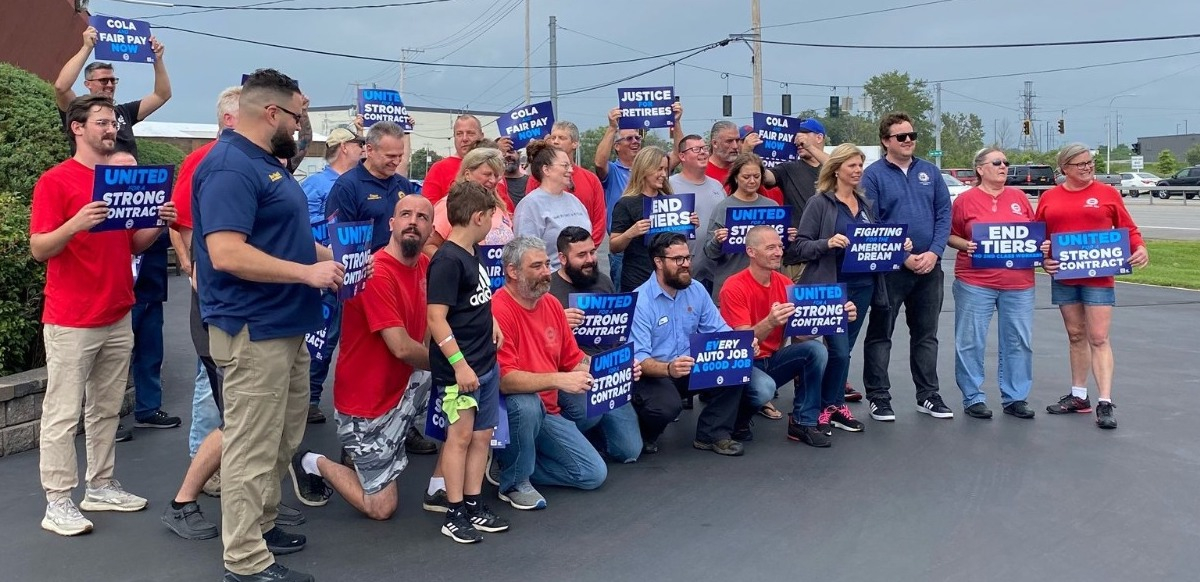Fight for Safety, Own the Shop Floor

Auto Workers in Local 897 in Buffalo participated in a practice picket in August. They have built a strong safety culture at their Ford stamping plant. Photo: UAW Local 897.
Earlier this year, on the Ford stamping line in Buffalo, sewage started pouring onto the floor. Careless managers had shut down a pump to install new equipment and caused a deluge.
The workers didn't work meekly through the dizzying stench. They shut down their line, fast. And they did it with so much unity that their manager decided not to fight back.
That collective action didn't come out of nowhere. Over the last few years, Auto Workers at Local 897 have built a fighting safety culture.
They elected new local officers who turned “militant” into a badge of honor. Members stopped the line when poorly routed forklifts dropped metal sheets near workers. They got four managers fired with safety grievances and shop floor confrontations.
“We put fear into the company,” says longtime Ford Buffalo worker Ryder Littlejohn, “Now, we walk through the floor, it’s like the Red Sea parting.”
TAKING CONTROL
As the UAW revs up for a likely strike at the Big 3, members are showing a hunger to stand up to their employers more than any time in recent memory.
In plants that don’t go on strike, it could be prime time to use that momentum to push on safety. (But note this is a tricky area legally—any walk-offs should be specific to a particular grievance over a workplace hazard).
Fights for shop floor safety can determine how work gets done. When we stand up for safer work, we can take control away from boardroom vultures who never turned a wrench or nursed a patient.
Direct action over safety is supposed to be protected by the law, at least on paper. The National Labor Relations Board's webpage on the right to strike even says, “A walkout because of conditions abnormally dangerous to health, such as a defective ventilation system in a spray-painting shop, has been held not to violate a no-strike provision,” based on Section 502 of the National Labor Relations Act.
As climate chaos gets more lethal every year, that provision could help save lives. Unfortunately, right-wing courts and Board members have imposed extreme conditions for what counts as “abnormally dangerous.” And the boss rarely cares about legal fine print, which is why walkouts for safety take a lot of unity to win.
When Electrical Workers walked off a Microsoft construction site during choking wildfire smoke in Seattle last year, everyone on shift stuck together. They still got paid, and no one faced retaliation. But at GM’s Ultium plant in Ohio, when six battery workers bravely walked off due to lack of OSHA-required safety showers, they were suspended for months by managers keen on setting a cruel example.
If there’s time, before leaping into a safety action, talk to all the co-workers you can, and come up with a plan together. It might take everyone on shift, even across departments, to pull off an effective action.
To make it stick, unions like the Auto Workers in Buffalo and Steelworkers at many refineries build worker safety committees, or win contract provisions for safety officers—picked by workers—who can do safety work as a portion of their paid job.
SAVE LIMBS AND LIVES
Direct action on safety is high stakes, more than filing a grievance is. But it can also quickly bring workers together, because collectively defying our boss can save limbs and lives.
Last month, union workers Tony Rufus at Kroger in Tennessee and Chris Begley at UPS in Texas died on the job when managers pushed them to work too fast through brutal heat. A month earlier, Dallas letter carrier Eugene Gates, Jr., died on the job for the same reason. In the court of the labor movement, we should call these homicides: by shift bosses who forced an unsafe pace, and by bigger bosses who are wrecking the climate for profit.
We can honor the dead by making sure none of our co-workers and union siblings get the same raw deal. We can open up workplace conversations about what’s dangerous. And we can decide together how we want to run the shop differently, whatever the boss thinks.
These are our bodies on the line. And it’s our know-how and solidarity that can make us safe.





